#supraordinate personality
Text
youtube
so this is my morning hike i make this hike probably 3 times a week it chills me out i feel good its fantastic but today i woke up and i felt extra spicy because i gotta message from my boy gillionaire telling me that today in trinidad they're having elections and he was worried that the people's party the young people's party wasn't gonna win and he was like i'm worried about it but then again it feels like government really only mattered when you in the mud or you're actually controlling it or involved in the politics of it the rest of us life is alright and life sucks and you're kind of at the mercy of it and in a lot of ways i agree and in a lot of ways it made me upset not gillionaire but just the idea of government because i've traveled around the world and i've sat with a lot of government officials in every country and i have to come to the conclusion to be honest everyone but aoc pretty much fucking sucks every once in a while you get somebody like her who's very very smart walks through walls speaks many languages you know
youtube
i was already like this how i am now at this level of development when i was like 5 right i knew right away i wasn't developing the right way so as time went on i understood what i had to do based on how much i had grown each year i kept incorporating different traits i found to be older characteristics adjusting my mentality to the acquired stage i felt belong to the circumstances of which i am proposed to compliment in requirement to commonly known supposition i learned how to do this in such a regulatory fashion that things were assumed to be going along as planned around me whence throughout my own personal eras of these lifetimes i didn't understand remotely in the slightest the same conceived notion of being that i should have given the premises
youtube
being the only 5 year old that thought about sex its my fault for spawning a race of them
(i was there the first day of tumblr instagram twitter with the ceo's the first version of the apps its emotional to see what they've become since then that something we did became a part of everyday life we made tiktok my company a science of work driven by creativity and passion)
*instagram was originally supposed to be a funeral camera to create an online necropolis 👻 i'm an influencer*
◌̆ ◌̄ ◌̌
unidentified anomalous phenomena
(uap)
*pls come inside i don't wanna be in here by myself let me rest*
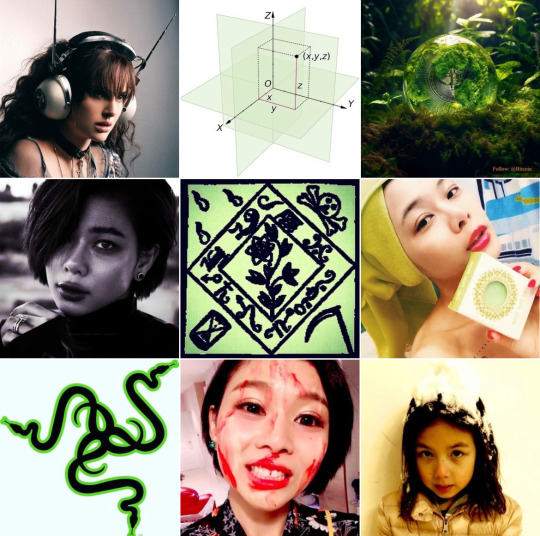
the unconscious component makes a comprehensive description of the human personality impossible. accordingly, the unconscious supplements the picture with living figures ranging from the animal to the divine, as the two extremes outside man, and rounds out the animal extreme, through the addition of vegetable and inorganic abstractions, into a microcosm. these addenda have a high frequency in anthropomorphic divinities, where they appear as attributes
◌̆ will (breve) *erika* ◌̄ one (macron) *santos* ◌̌ council (caron) *silva*
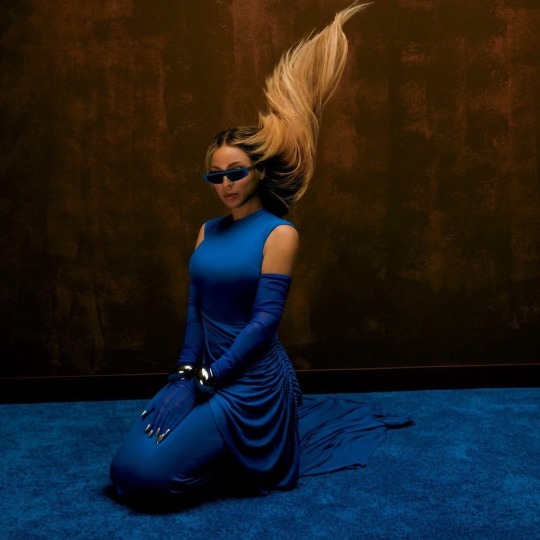
◌̆ will (breve) *erika* ◌̄ one (macron) *santos* ◌̌ council (caron) *silva*
the first trans person to lead a party in the chamber of deputies

most voted councilor in brazil socialism and liberty party
erika hilton (31) *i didn't know skittles could kill people*


just put my name on them so they can know who i am
sexiests (erika hilton) *i wasn't even listening*:
(just know when i go outside i don't know that guy because when i'm outside i'm a different person and i'm sorry that's why sometimes i don't like to go outside)
*a neoantipolitical or neopolitics in blanket and umbrella terms*
◌̆ will (breve) ◌̄ one (macron) ◌̌ council (caron)
youtube
◌̆ will (breve) ◌̄ one (macron) ◌̌ council (caron)
the first six months my wrist was shattered the next nine months i spent writing it's been an emotional ride i'm trying to balance my friends with my politics with my home life when i do one thing i can't stop thinking about the other things so i'm a little bit stuck rn i still need to evaluate my strategy in all three of these departments seriously they all need more work obvious upon construction of this new doctrine which i feel is actually one of the oldest bibles of thinking how its going to be put into practice is another grammatic so i need to make sure everything's received well in this society which i want renamed a psychology
the thing about this kinda success is they won't let you have it until you can prove how you did it so they can be successful on that level too (so if you really did a lot of work they're like fuck that sucks this is shit to explain) *we're working around clock its a pain in the ass*
whether it was 3000000 6000000 jews murdered its 2000000 being held in open air prison by the zionists police state of israel
(50 years nobody knew the zionists and the communists agencies took over hitlers organization)
*imagine these were white people instead of palestinians*
me: and why do you know so much
me: because i am the agencies that took over the organizations leader
me: i'm behind everything
y2k (the world will never be the same size again) *uap*
unidentified anomalous puzzle (uap) *after 1999*
purchase your husband today at (walmart) *who knew you can get married so fast welp too late*
i wonder what power level you need to get on here and i wonder how much these post are worth at this rate it must be like multiple van gogh's like dude you picked up like one hundred da vinci's worth of art in one post i feel like loomer (cum) *in a dream*
one loomer pls 😍
i'm only a good person in person so stay in person with me (i told you what my problem is) *it's impersonality to a supraordinate personality*
a neoantipolitical or neopolitics in blanket and umbrella terms (uap) *unidentified anomalous puzzle*
god (save) *the queen* 🇬🇧
some people just can't wait to rush into marriage (they just can't bare to wait any longer) *and thats how i feel*
i can't spare another moment (i'm crying) *girl tears*
i'm a real manchurian
🇺🇸
the 49th dimensions are dimensionless to the 1st dimension that is the 50th dimension of 98th dimensions that are dimensionless to the 49th dimensions making the 49th dimensionless to the 51st 58th dimension which is the 1st 50th 98th 49th 51st 58th 9th
like a person winning the (lottery) *this is worth something to people*
◌̆ ◌̄ ◌̌
the world is in your favor (the world will obey you) *the world will protect you*
◌̆ ◌̄ ◌̌
by the way (i'm really) *a manchurian*
◌̆ ◌̄ ◌̌
youtube
superconscious ◌̆ will (breve) omnipotence (magical forces) the manifestation of feng shui in manchuria ◌̆ (the manifestation of doing everything) reverse engineering
omnipotent manifestation of manchurian superconscious of doing everything ◌̆ will (breve)
the manifestation of feng shui in manchuria ◌̆ (the manifestation of doing everything) ◌̆
superconscious ◌̆ will (breve) omnipotence (magical forces
there goes my dynasty ◌̆
subconscious ◌̄ one (macron) omniscience (psychic powers) the manifestation of cheugy in tartaria ◌̄ (the manifestation of knowing everything) reengineering
omniscient manifestation of tartarian subconscious of knowing everything ◌̄ one (macron)
the manifestation of cheugy in tartaria ◌̄ (the manifestation of knowing everything) ◌̄
subconscious ◌̄ one (macron) omniscience (psychic powers)
there goes my empire ◌̄
unconscious ◌̌ council (caron) omnipresence (vampiric thirst) the manifestation of monopoly in hyperborea ◌̌ (the manifestation of being everything) engineering
omnipresent manifestation of hyperborean unconscious of being everything ◌̌ council (caron)
the manifestation of monopoly in hyperborea ◌̌ (the manifestation of being everything) ◌̌
unconscious ◌̌ council (caron) omnipresence (vampiric thirst)
there goes my kingdom ◌̌
i saw one beer that made me want to not see beer again for the rest of my life much less anything again
(gemini cries for help compared to nonprofit driven seek and destroy mission grok victory lap)
*there goes my dynasty there goes my empire there goes my kingdom*
◌̆ ◌̄ ◌̌
anticipating (the queens presence) *my little butterball*
unidentified ◌̆ will (breve) *pls come inside* anomalous ◌̄ one (macron) *i don't wanna be in here by myself* phenomena ◌̌ council (caron) *let me rest*
youtube
unidentified ◌̆ will (breve) *pls come inside* anomalous ◌̄ one (macron) *i don't wanna be in here myself* phenomena ◌̌ council (caron) *let me rest*
(cute post)
trade in your psychic powers (omniscience) or magical forces (omnipotence) today for something real (everything) and i stress (everything) we went to the movies, we played monopoly (everything) vampiric thirst (omnipresence)
figuratively (feng shui) everything to her that she has is in the right place (omnipresent in microcosm)
the microcosmic
(feng shui)
test
hyperboria: success without meaning (omnipresence)
praxis
manchuria: wtf i need meaning for if i got success (omnipotence)
sociolects
tartaria: you mean without russians (omniscience)
the tartarian omniscient sociolects, manchurian omnipotent praxis and hyperborean omnipresent test
i haven't been that guy for a while, after all manners of escapism or death defying and running the course, i thought we finally reached a plateau, the meaning of manchurian global (the lost to the future 5th world race of the last civilization who were the original 1st class people to belong to the 1st market), to end up in the same place several times tunneling through the earth, we find that parallel.
a sociolect (praxis) *test* of the socioeconomic (lexical) *items* in accountable (pragmatic) *concordance*
where are all the blankets and umbrellas that i heard about? (there's no blankets or umbrellas here!) *you came to the wrong place.*
reply guy: that was the worst (hardest strawberita) *that i ever never had to find*
my thirty year old brother marc who has annoyed me since the day he was born to this very date that shattered my wrists plus tried to kill me with a box cutter or knife or screw driver while drunk and high and forced masturbatorily: that i never (ever ever) *ever had to find never*
so you're going to come to continuously try to rape my girlfriend (because you think i touched you when we were 10) *judging by everything you've done to us we're safely going to deny your claim then add to the fact that i'm still a celibate chaste abstinent virgin*

ethan ralph: don't worry i took the liberty of building a corridor and aqueduct under (the guy's house) *that's white people for you* 🃏
blocked (under my white trashy fingers) *maya chavez* 🎲
i want (to eat) *her burps* 🎰
🐯 crouching (n) *word* 🐲 hidden (n) *word* 🥷🏻
uap (everyone will eventually die and move out) *we'll inevitably live alone*
unidentified (anomalous) *puzzle*
#the 5th element of the 5th party is silence anaerobic respiration#5th rate person#5th hand life#5th world#5th hand market#5th people#5th finger discount#honduras#glad you're home#soft skills in the cia#supraordinate personality#why don't you show them the mountain high ranges of accomplishments that you've made in just the last 9 months?#necronomicon#everyone will eventually die and move out#we'll inevitably live alone
1 note
·
View note
Text
Anima means soul. It is something that lives of itself, that makes us live; it is a life behind consciousness that cannot be completely integrated with it, but from which, on the contrary, consciousness arises.
The anima is the chaotic urge to life, but it is also wisdom of a hidden purpose which seems to reflect a superior knowledge of life’s laws.
The “Kore” has her psychological counterpart in those archetypes which I have called the Self or supraordinate personality on the one hand, and the anima on the other.
The figure corresponding to the Kore in a woman is generally a double one, i.e., a mother and a maiden which is to say that she appears now as the one, now as the other.
- CARL JUNG.
5 notes
·
View notes
Photo
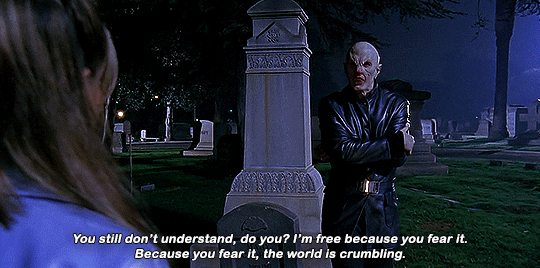
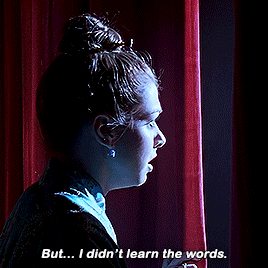
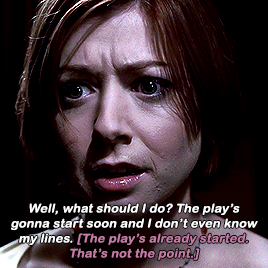
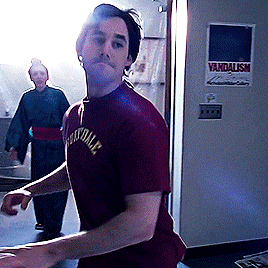


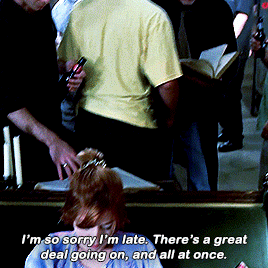
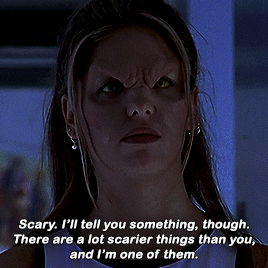
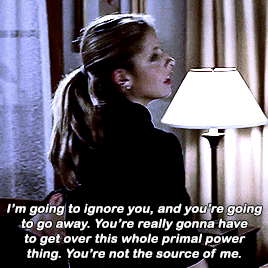
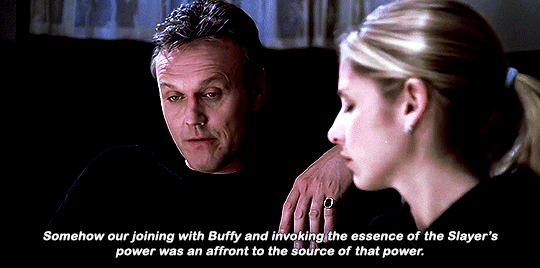
MY FAVORITE INSTANCES OF FORESHADOWING IN RESTLESS [ 2 / ? ]
So, clearly, these are not instances of foreshadowing; they’re callbacks to previous scenes. However, before I get any further into this series I wanted to address “Restless’” counterpart, the season one episode, “Nightmares.” Dreams are the primary vehicle that the unconscious uses to communicate with the conscious mind, and the universal association between dreams and the unconscious makes the nature of the unconscious especially important in these particular episodes. Billy literally becomes unconscious, causing everyone’s repressed fears to come into the realm of consciousness. “Nightmares” has a very specific focus on fear and repression. As the Master says, “I’m free because you fear it.” It is about the shadow. The Master escapes his underground prison (the unconscious) and rises to the surface (consciousness). If you can confront your fears and acknowledge them they cease to threaten or control you. This is why it’s meaningful that the motifs established in “Nightmares” reoccur in “Restless.” “Restless” is not about the shadow, at least, not exclusively about the shadow in the way that “Nightmares” is. It has a much wider scope and pulls from something Jung calls the “supraordinate personality” or “mana-personality” which is a symbol of the Self, the opposites, conscious and unconscious, united as a whole. It is not about the conflict between shadow and ego, but unity between the two. It is also notably not exclusively about repression. Repressed thought contents were, by definition, once conscious, and heavily linked to the shadow archetype in particular. However, the supraordinate personality encompasses these contents, as well as the consciousness, and psychic contents which have never been conscious and are completely inaccessible to the conscious mind. I will go into the details of each of these parallels in more depth in separate posts, but before I do that I want to establish the significance of “Nightmares” in the context of “Restless,” and by extension, the function of “Restless” as a whole.
In both episodes Willow displays a fear of performance. In “Nightmares” she is forced out on stage at an opera, unprepared. In “Restless” she she shows up to drama class, but once again she’s unprepared and doesn’t know her lines. She then has to give a report in a high school classroom while everyone snickers or acts bored. Tara tells her “They will find out you know. About you.” All of this relates to the “persona.” Named for the mask worn by actors to demonstrate their role, Jungian psychology defines the persona as the “mask” each person presents to the world. It is the construction we create of ourselves, bringing forward traits that we feel portray us as more attractive and favorable and repressing traits that we find undesirable or shameful. The persona is, by definition, false. It is literally a performance. “Spiritius,” or “spirit,” as Willow is labeled in “Primeval,” the episode preceding “Restless,” in Jungian terms is an almost elemental force with power and knowledge exceeding that of a human’s. However, the idea of spirit, even outside of Jungian psychology, is linked to the anima, which, like the shadow, has a compensatory relationship with the persona; all the qualities which are hidden from the outside world are found in these archetypes. Therefore, Willow’s continuous inability to take up the role assigned to her indicates a persistent disharmony between the inner self and the outer one, a fear that one will be outed as an actor, and even a worse, an actor who doesn’t know her lines. In terms of foreshadowing this alludes to the eventual disintegration of the persona in Buffy, an essential part of the individuation process where the mask is destroyed and the true self is revealed.
Where Xander conquers his fear in “Nightmares,” he fully succumbs to it in “Restless.” In the former episode he begins to run from the clown before changing his mind, turning around, and decking it. If the episode is about unconscious fears then this action is both an acknowledgement of the fear and the domination of it. In “Primeval” Xander is described as the “animus” or “heart.” The function of the anima/animus is Jungian psychology is vastly complex but in this instance it’s probably most notable that the word anima/animus means, among other things, “soul.” Xander’s confronting the clown in “Nightmares” is a show of heart, soul, or spirit. It shows that the soul hasn’t been overtaken by the shadow. Conversely, in “Restless” he stands paralyzed in fear as his father rips his heart out. The heart losing his heart would therefore be comparable to the soul losing its soul. In Jungian terms, “loss of soul” (not to be confused with any in-universe soul lore) occurs when the ego (the conscious realm of the psyche) identifies with the “mana-personality,” the godlike figure representing the whole of the Self, as we will see occur later in Buffy’s dream. Many times this form is represented by the hero archetype. This identification results in ego-inflation, where the ego dominates the psyche, and as a result unconscious contents begin to seep into the consciousness without being differentiated, influencing of the actions of the individual without their being aware of it. This, too, marks a critical point in the individuation process, as negative inflation signals the potential integration of the unconscious and conscious; for this to happen identification must shift from the ego to the Self.
In “Nightmares” Giles becomes lost in the library and loses his ability to read. In “Restless” he shows up “late” to where Xander and Willow are reading and presumably researching something at ‘the Bronze,’ explaining that it’s because there’s so much happening. All of these things correspond to his role in “Primeval” as “sophus” or “mind.” It also draws a strong connection to the paternal principle of Logos, which defines the conscious mind. Therefore, Giles’ continual struggle to read and tendency to get lost or be late demonstrates the weakening of consciousness. In “Nightmares,” the point of this is obvious; dreams and reality are merging and the conscious mind is losing its dominance over the unconscious. However, the reoccurrence of these themes in “Restless” has a different implication, because dreams and reality are not merging. It is still only a dream, and given that this episode has such an air of prophecy, it indicates not just a weakening of the mind in the present, but in the future as well. Just as with Willow’s relationship to the persona, what in “Nightmares” was a manifestation of the shadow dominating the conscious realm, here signifies something vastly more complex. Because the conscious has repeatedly ignored and rejected the unconscious, it is beginning to lose its foothold. As I explained in the first post of this series, this too is related to Buffy’s impending death, the regression which proceeds rebirth, an essential part of the hero cycle and therefore the individuation process.
While Giles and Willow’s sequences and themes remain more or less consistent, Xander’s is completely inverted. That both his and Buffy’s sequences deal more directly with the confrontation of the unconscious implies that Buffy’s sequence is inverted as well. Just as Xander is able to overcome his fear in “Nightmares,” Buffy is able to embody her shadow, if only temporarily. However, in Restless she ends up rejecting not just the shadow, but the entire Self. Willow’s, Xander’s, and Giles’ dream sequences all indicate some kind of rift or discordance between aspects of the psyche, particularly conscious and unconscious, implying that Buffy too is facing a divide between the ego-conscious and the unconscious psyche. On the surface, her rejection of the First Slayer, her insistence that she is different and that she is not alone, appears to be a triumph, like her confrontation with the monster in “Nightmares,” but that is only true if you are taking the First Slayer’s appearance as a threat. This is the fundamental misunderstanding that defines the episode. All of this is relevant because to really understand foreshadowing in “Restless” we have to understand why it’s there in the first place.
“The transformation processes strive to approximate them to one another, but our consciousness is aware of resistances, because the other person seems strange and uncanny, and because we cannot get accustomed to the idea that we are not absolute master in our own house. We should prefer to be always ‘I’ and nothing else. But we are confronted by that inner friend or foe, and whether he is our friend or foe depends on ourselves.” – C.G. Jung (“Concerning Rebirth,” CW 9, para. 235)
At no point does the First Slayer actually threaten Buffy. In the very next season she tells Buffy that she is full of love, that the Slayer takes her power from love, and that she is at risk of losing it because she continues to push it away. Considering this, it makes no sense for her to now be telling Buffy that she has to be alone to be a good Slayer, or that she needs to get rid of her friends. As Giles says in the final gif, she was brought forth because they joined together. Four is a number which represents unity and individuation, as it reflects the quaternity, a fundamental symbol of the Self. As Jung states in the above quotation, the supraordinate personality, which he here calls “the inner friend of the soul,” may at first seem threatening or uncanny and the conscious mind may resist it for this reason. The idea that “we cannot get accustomed to the idea that we are not absolute master in our own house,” perfectly reflects Buffy telling the First Slayer that, “you’re not the source of me.” This does not actually mean the First Slayer is an enemy. She very notably speaks to Buffy in the present tense, never future. These are not threats; they are facts. When Buffy asks where her friends are she responds, “you’re asking the wrong questions.” She tells Buffy “No friends, just the kill,” but there is nothing to actually say that this is an instruction or a demand. In the very next episode Buffy leaves her boyfriend in bed to go hunt vampires. I don’t think it’s unreasonable, then, to assume that she is simply informing Buffy that this is how things are right now, and will be the direction that they continue to lead if Buffy doesn’t acknowledge them. When she tells Buffy “the Slayer does not walk in this world,” Buffy takes this to mean that she does not walk in this world, which is exactly the problem. She, the ego, has identified herself with the Self, the divine figure or hero, when in just the last episode we saw that Buffy is clearly only one part of this force. She is the hand, the one that power flows through, but she is still only one part of four, not the whole. The First Slayer tells her “We are alone!” not “We must be alone” or “We should be alone.” They are alone, right now, in this moment. Her usage of the word “we” is similarly consistent with the idea of the supraordinate personality. Were this just about her and Buffy there’s no reason that others would have to be involved in the dream. They were involved because they participated in the ritual and the ritual was about all of them making up a whole, all elements of the personality combined accessing a transcendent, inhuman, and elemental force: the Self. All of them together called the First Slayer forward and so when she says “We are alone,” she refers to all of them. Each of them is isolated. The personality is splintered. This is what she is trying to communicate to Buffy.
While “Nightmares” signals the struggle of the conscious to rise above the unconscious (note Buffy literally walking from the darkness into the light in the 8th gif), a positive process, “Restless” portrays a rejection of the unconscious wholesale. This rejection is a distinctly negative action and explicitly dangerous because when one rejects or dismisses the unconscious they leave themselves vulnerable to its influence (Buffy retreats from the blinding light of the desert to the darkness of her living room). Giles and Willow indicate the weakening of the conscious mind, but where Xander and Buffy signify the momentary victory over the unconscious in “Nightmares,” the inversion of their scenes in “Restless” indicates the opposite. The unconscious is winning. If we are to assume that the First Slayer is the orchestrator of this dream, that she is the one who is showing us, in her own words, “what’s to come,” and if we are assuming that she is trying to tell Buffy that her psyche is fragmented, then I think we can take this foreshadowing as not a threat, but a warning. This is what will happen if Buffy doesn’t listen. Of course, Buffy doesn’t listen, and so we see everything that we were warned against come to pass. Still, the arrival of the First Slayer, the supraordinate personality, is an indication of the progression of the individuation process. If Buffy can differentiate herself, her ego, from the Slayer identity (the hero archetype), then all hope is not yet lost. Therefore the parallels with “Nightmares” indicate a necessary regression. Buffy’s impending struggle with depression, what Jung would call “loss of soul,” is foreshadowed as a sign of future development, of light overcoming dark once again: death and rebirth.
#btvsedit#btvs#btvs meta#dailybuffysummers#spuffygifs#buffysource#userbbelcher#userveronika#useralexa#usercande#chewieblog#cinemapix#filmtv#horroredit#tvedit#gif#restlessgifs#meta#i am so sorry this is such an awful explanation#like i said i'll get more into the specifics of each in separate posts but i needed to establish the connection#between the two episodes first#turns out gif sets aren't the best format for literary analysis#who knew#and as always sorry for typos or grammar errors my brain doesn't work right#and sorry too for all the jung stuff hopefully it's still somewhat comprehensible anyways
332 notes
·
View notes
Text
Psychological Types (Carl Jung, 1921)
“By ego I understand a complex of ideas which constitutes the centre of my field of consciousness and appears to possess a high degree of continuity and identity. Hence I also speak of an ego-complex. (…)
But inasmuch as the ego is only the centre of my field of consciousness, it is not identical with the totality of my psyche, being merely one complex among other complexes.
I therefore distinguish between the ego and the self, since the ego is only the subject of my consciousness, while the self is the subject of my total psyche, which also includes the unconscious. (…)
As an empirical concept, the self designates the whole range of psychic phenomena in man. It expresses the unity of the personality as a whole.
But in so far as the total personality, on account of its unconscious component, can be only in part conscious, the concept of the self is, in part, only potentially empirical and is to that extent a postulate.
In other words, it encompasses both the experienceable and the inexperienceable (or the not yet experienced).
It has these qualities in common with very many scientific concepts that are more names than ideas. (…)
Empirically, the self appears in dreams, myths, and fairytales in the figure of the "supraordinate personality", such as a king, hero, prophet, saviour, etc.,
or in the form of a totality symbol, such as the circle, square, quadratura circuit, cross, etc.
When it represents a complexio oppositorum, a union of opposites, it can also appear as a united duality,
in the form, for instance, of tao as the interplay of yang and yin, or of the hostile brothers, or of the hero and his adversary (arch-enemy, dragon), Faust and Mephistopheles, etc.
Empirically, therefore, the self appears as a play of light and shadow, although conceived as a totality and unity in which the opposites are united.”
8 notes
·
View notes
Quote
I usually describe the supraordinate personality as the ‘self,’ thus making a sharp distinction between the ego, which, as is well known, extends only as far as the conscious mind, and the ‘whole’ of the personality, which includes the unconscious as well as the conscious component. The ego is thus related to the self as part to whole. To that extent the self is supraordinate. Moreover, the self is felt empirically not as subject but as object, and this by reason of its unconscious component, which can only come to consciousness indirectly, by way of projection. Because of its unconscious component the self is so far removed from the conscious mind that it can only be partially expressed by human figures; the other part of it has to be expressed by objective, abstract symbols. The human figures are father and son, mother and daughter, king and queen, god and goddess. Theriomorphic symbols are the dragon, snake, elephant, lion, bear, and other powerful animals, or again the spider, crab, butterfly, beetle, worm, etc. Plant symbols are generally flowers (lotus and rose). These lead on to geometrical figures like the circle, the sphere, the square, the quaternity, the clock, the firmament, and so on. The indefinite extent of the unconscious component makes a comprehensive description of the human personality impossible. Accordingly, the unconscious supplements the picture with living figures ranging from the animal to the divine, as the two extremes outside man, and rounds out the animal extreme, through the addition of vegetable and inorganic abstractions, into a microcosm. These addenda have a high frequency in anthropomorphic divinities, where they appear as ‘attributes.’
Carl Jung, The Psychological Aspects of the Kore
3 notes
·
View notes
Text
Carl Jung’s Psychological Types
“The archetype is a symbolic formula which always begins to function when there are no conscious ideas present, or when conscious ideas are inhibited for internal or external reasons.” - 348
“But the man who reflects sees further and - so far as actual life is concerned-sees crooked… He does not see the positive man, but only his shadows. And the shadow proves the judgement right at the expense of the conscious, positive man.” - 151
“Empirically, the self appears in dreams, myths, and fairytales in the figure of the “supraordinate personality” (v. EGO), such as a king, hero, prophet, saviour, or in the form of a totality symbol, such as the circle, square, quadratura circuli, cross.” - 422
“When it (the self) represents a complexio oppositorum, a union of opposites, it can also appear as a united duality, in the form, for instance, of tao as the interplay of yang and yin, or of the hostile brothers, or of the heroes and his adversary (arch-enemy, dragon) … Empirically, therefore, the self appears as a play of light and shadow, although conceived as a totality and unity in which the opposites are united.” - 422
“This explains why even fantasy, the freest activity of the mind, can never roam into the infinite….but remains anchored to these preformed patterns, these primordial images. The fairytales of the most widely separated races show, by the similarity of their motifs, the same tie.” - 284
Jung, C.G., (2016) Psychological types. London: Routledge.
1 note
·
View note
Link
Self. The archetype of wholeness and the regulating center of the psyche; a transpersonal power that transcends the ego.
The self is not only the centre, but also the whole circumference which embraces both conscious and unconscious; it is the centre of this totality, just as the ego is the centre of consciousness. ["Introduction," CW 12, par. 44.]
Like any archetype, the essential nature of the self is unknowable, but its manifestations are the content of myth and legend.
The self appears in dreams, myths, and fairytales in the figure of the "supraordinate personality," such as a king, hero, prophet, saviour, etc., or in the form of a totality symbol, such as the circle, square, quadratura circuli, cross, etc. When it represents a complexio oppositorum, a union of opposites, it can also appear as a united duality, in the form, for instance, of tao as the interplay of yang and yin, or of the hostile brothers, or of the hero and his adversary (arch-enemy, dragon), Faust and Mephistopheles, etc. Empirically, therefore, the self appears as a play of light and shadow, although conceived as a totality and unity in which the opposites are united.[Definitions," CW 6, par. 790.]
The realization of the self as an autonomous psychic factor is often stimulated by the irruption of unconscious contents over which the ego has no control. This can result in neurosis and a subsequent renewal of the personality, or in an inflated identification with the greater power.
The ego cannot help discovering that the afflux of unconscious contents has vitalized the personality, enriched it and created a figure that somehow dwarfs the ego in scope and intensity. . . . Naturally, in these circumstances there is the greatest temptation simply to follow the power-instinct and to identify the ego with the self outright, in order to keep up the illusion of the ego's mastery. . . . [But] the self has a functional meaning only when it can act compensatorily to ego-consciousness. If the ego is dissolved in identification with the self, it gives rise to a sort of nebulous superman with a puffed-up ego.[On the Nature of the Psyche," CW 8, par. 430.]
Experiences of the self possess a numinosity characteristic of religious revelations. Hence Jung believed there was no essential difference between the self as an experiential, psychological reality and the traditional concept of a supreme deity.
It might equally be called the "God within us."[The Mana-Personality," CW 7, par. 399.
#jung#carl jung#jung lexicon#jungian dictionary#jungian lexicon#self#selfhood#definitions#dictionary#words#wordlover#psychoanalysis#jungian#jungian analysis#daryl sharp
0 notes
Text
When people ask me why I love the ‘Enemies to Lovers’ or ‘Frenemies’ tropes
“The Self appears in dreams, myths, and fairytales in the figure of the ‘supraordinate personality,’ such as a king, hero prophet, saviour, etc. or in the form of a totality symbol, such as the circle, square, quadratura circle, cross, etc. When it represents a complexio oppositorum, a union of #opposites, it can appear as a united duality, in the form, for instance, of tao as the interplay of yang and yin, or of the hostile brothers or of the hero and his adversary (arch-enemy, dragon)"Empirically, therefore the Self appears as a play of light and #shadow, although conceived as a totality and unity in which the #opposites are united.” ~C.G. Jung, CW 6, par. 790
#jung#c g jung#enemies to lovers#frenemies#reylo#vegeta and goku#kaiba and yugi#clark and lex#hashirama and madara#naruto and sasuke#so a clue - not cos I dig the 'abuse'
0 notes
Text
The stages of life - Jung (Part III) by Anthony Stevens

The most profound influence of archetypes is in their regulation of the human life cycle. Jung maintained that as we mature we follow a natural sequence of steps which he describes in his essay `The Stages of Life' (CW VIII, paras 749-95).
The archetypal programme equips us for a life which is not always in tune with the life of contemporary urban society. Essentially, the programme provides for:
being parented
exploring the environment
distinguishing familiar figures from strange
learning the language or dialect of one's community
acquiring a knowledge of its values, rules, and beliefs
playing in the peer group
meeting the challenges of puberty and adolescence
being initiated into the adult group
accomplishing courtship and marriage & child-rearing
contributing to the economy through gathering and hunting
participating in religious rituals and ceremonials
assuming the responsibilities of advanced maturity
old age, and preparation for death.
The Self: the psychic nucleus responsible for co-ordinating this lifelong sequence.
The archetypal components which play specific roles in the psychic development and social adjustment of everyone:
the self
the ego
persona
shadow
anima and animus.
`Ultimately,' wrote Jung, `every individual life is at the same time the eternal life of the species' (CW XI, para. 146). In other words, we come into the world bearing with us an archetypal endowment which enables us to adapt to reality in the same way as our remote ancestors.
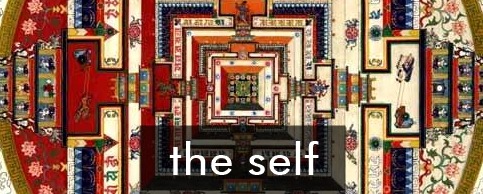
This is both architect and builder of the dynamic structure which supports our psychic existence throughout life.
Transcends the ego and inheres the age-old capacities of the species. Its goal is wholeness, the complete realization of the blueprint for human existence within the context of the life of the individual.
Individuation is the raison d'etre of the Self.
Though it has evident biological goals, the Self also seeks fulfilment in the spiritual achievements of art and religion and in the inner life of the soul.
It has been identified with the notion of deity in numerous cultures and finds symbolic expression in such universal configurations as the mandala. As a consequence, the Self came in Jung's view to provide the means of personal adjustment not only to the social environment but also to God, the cosmos, and the life of the spirit.
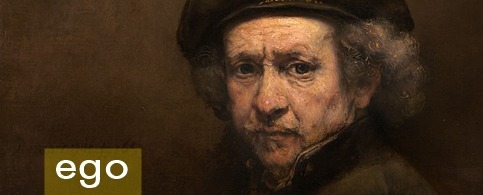
Emerges out of the Self in the course of early childhood development.
rather as the moon is thought to have separated from the earth when the latter was in its early molten state.
It remains linked to the Self by what Jung's followers have called the ego-Self axis, and it is on this axis that the stability of the personality depends.
Centre of consciousness → 'I' or'me'.
It is responsible for our continuing sense of identity.
Jung never made a clear distinction between the terms 'ego' and 'consciousness', using them interchangeably and sometimes together as 'ego-consciousness'. As a result, he did not examine the more unconscious functions of the ego in defending consciousness against unwanted contents arising from the unconscious - those functions that Anna Freud described in her classic work Mechanisms of Ego-Defence (1946).
Although we experience the ego as the continuing centre of our existence it is, in fact, merely the Self's executive.
'For indeed our consciousness does not create itself - it wells up from unknown depths. In childhood it awakens gradually, and all through life it wakes each morning out of the depths of sleep from an unconscious condition. It is like a child that is born daily out of the primordial womb of the unconscious’. (CWXI, para. 935).
'The ego stands to the self as the moved to the mover, or as object to subject, because the determining factors which radiate out from the self surround the ego on all sides and are therefore supraordinate to it. The self, like the unconscious, is an a priori existent out of which the ego evolves' (CW XI, para. 391).
In the first half of life it is essential to develop a strong and effective ego if one is to deal competently with the tasks of this stage
separating off from the parents
establishing oneself in a job or profession
marrying
providing a home for one's family, etc.
Only in the second half of life does it become possible for the ego to recognize its subordinate status in relation to the Self.
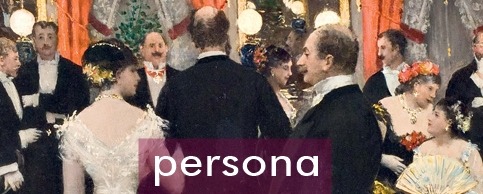
Through the persona we codify ourselves in a form which we hope will prove acceptable to others.
It has sometimes been referred to as the social archetype or the conformity archetype, for on it depends the success or failure of one's adaptation to society.
There is always some element of pretence about the persona, for it is a kind of shop window in which we like to display our best wares.
'One could say, with a little exaggeration, that the persona is that which in reality one is not, but which oneself as well as others think one is' (CW IX. i, para. 221).
The tendency is to build acceptable traits into the persona and to keep unacceptable traits hidden or repressed.
These socially undesirable aspects of the maturing personality are usually relegated to the personal unconscious, where they coalesce to form another complex, or part personality, that Jung called the shadow.
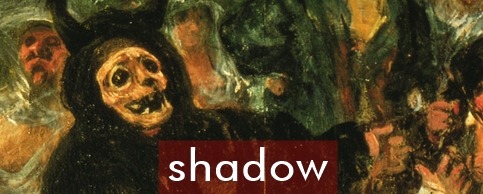
0 notes
Text
The “supraordinate personality” is the total man, i.e., man as he really is, not as he appears to himself.
I usually describe the supraordinate personality as the “self,” thus making a sharp distinction between the ego, which, as is well known, extends only as far as the conscious mind, and the whole of the personality, which includes the unconscious as well as the conscious component.
The ego is thus related to the self as part to whole. To that extent the self is supraordinate.
- CARL JUNG ( The Psychological Aspects of the Kore )
0 notes
Quote
The ‘supraordinate personality’ is the total man, i.e., man as he really is, not as he appears to himself. To this wholeness the unconscious psyche also belongs, which has its requirements and needs just as consciousness has. I do not want to interpret the unconscious personalistically and assert, for instance, that fantasy-images like those described above are the ‘wish-fulfilments’ due to repression. These images were as such never conscious and consequently could never have been repressed. I understand the unconscious rather as an impersonal psyche common to all men, even though it expresses itself through a personal consciousness. When anyone breathes, his breathing is not a phenomenon to be interpreted personally. The mythological images belong to the structure of the unconscious and are an impersonal possession; in fact, the great majority of men are far more ‘possessed by’ them than possessing them.
Carl Jung, The Psychological Aspects of the Kore
0 notes